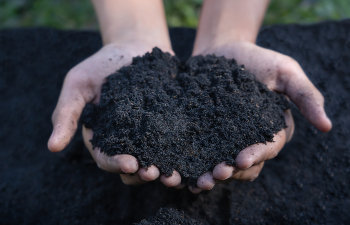
Lush green lawns, flourishing plants, and blossoming flowers – the dream of every homeowner and gardening enthusiast. Behind this verdant vision, however, lies the often-underestimated hero: the soil. Soil quality is the lifeblood of any garden, and at Pannone’s Lawn Pros & Landscaping, we know that achieving that magazine-cover garden starts from the ground up. If you’ve been left scratching your head, wondering why your plants aren’t thriving as they should, poor soil quality might be the culprit. So, let’s dig a little deeper!
Diagnosing Your Soil Type
Before you can improve your soil quality, it’s vital to know what type of soil you’re working with. Generally, soil can be categorized into three main types:
- Sandy Soil: This type of soil has larger particles and doesn’t retain water very well, which means it often lacks essential nutrients.
- Clay Soil: Dense and heavy, clay soil can hold water too effectively, leading to poor drainage and root rot.
- Loamy Soil: Often considered the gold standard for gardeners, loamy soil offers a balanced mixture of sand, silt, and clay, promoting good water retention and aeration.
To determine your soil type, take a handful of moist (but not wet) soil and give it a squeeze. If it falls apart easily, it’s sandy. If it stays in a lump, it’s more on the clay side. Perfect loamy soil will hold its shape but crumble upon being poked.
Enhancing Soil Quality: Tips and Techniques
- Composting: One of the most effective and eco-friendly ways to enrich your soil is by adding compost. Compost introduces vital organic matter, offering a buffet of nutrients for your plants.
- Natural Mulches: Mulching with organic materials like straw, leaves, or grass clippings not only conserves water and suppresses weeds but also gradually decomposes, adding essential nutrients back to the soil.
- Rotate Plants and Crops: Just like humans, different plants have varied dietary needs. Rotating your plants can prevent specific nutrients from being depleted in one area.
- pH Balancing: Plants thrive at different pH levels, but most prefer a slightly acidic to neutral pH. Kits are available to test your soil’s pH, and based on the results, you can add lime (to decrease acidity) or sulfur (to increase acidity).
- Aerate Compacted Soil: Especially crucial for clay soils, aeration can help improve oxygen circulation. This can be done using a garden fork or specialized tools.
- Add Organic Matter: In addition to compost, materials like well-rotted manure, leaf mold, or green manures can be mixed into the soil to increase its nutrient content and improve texture.
A Final Sprinkle of Wisdom from Pannone’s Lawn Pros & Landscaping
Improving soil quality isn’t a one-time activity; it’s an ongoing process. Just as we nourish our bodies regularly, our gardens also need continuous care to remain at their peak. With patience, persistence, and a little expertise from Pannone’s Lawn Pros & Landscaping, your soil can become the fertile foundation upon which your dream garden grows. Remember, every green thumb journey begins beneath the surface!
Posted on behalf of
1444 Buford Hwy
Cumming, GA 30041
Phone: (678) 294-0351
Email: pannoneslawnpros@gmail.com
Monday - Saturday 8:00 AM – 6:00 PM
